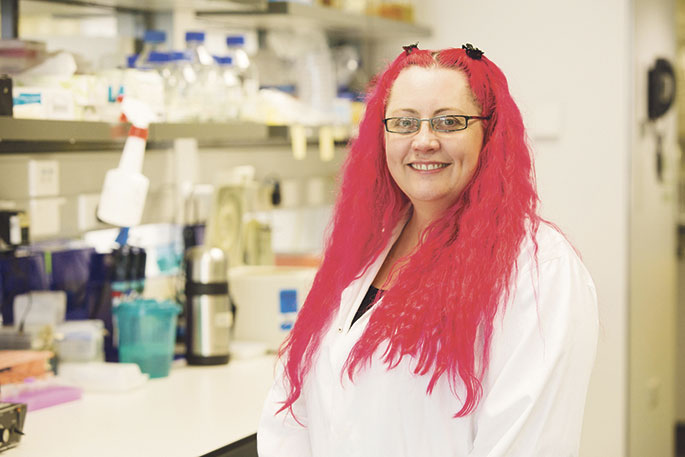There's not too many people that can light up a room, but scientist Dr Siouxsie Wiles, with her long, hot pink locks, is definitely one of them.
The microbiologist, and head of the Bioluminescent Superbugs Lab at the University of Auckland, is one of four keynote speakers at the House of Science's biennial science symposium ‘Curious Citizens' in Te Puke this week.
Siouxsie has been dying her hair pink since 2000, and says it was the nearest thing she could get to glowing in the dark.
She wears her pink hair proudly, believing it is important to destroy stereotypes about who scientists are.
'It's important that people outside of science, especially children who might be interested in going into science, see that you can be different,” she says.
'I've come to realise that it's as important within science too. I don't fit the image or the mould of what a scientist looks like, even within my community, so it's about challenging some of those stuffy professors who say ‘you can't possibly be serious looking like that'.”
Siouxsie will speak at the symposium next week about why we need to understand microbiology.
'Microbes are everywhere. Some are amazing and useful for important things and some are really awful. New Zealand has high rates of infectious diseases, so it's important to understand how to keep ourselves safe from microbes, but not to be too scared of them.
'I get lots of emails from people who are terrified of germs and are constantly washing their hands. There's a fine line between being aware of things and washing your hands when necessary, to being completely freaked out and exposing yourself to horrible chemicals because you have to keep everything clean.”
More often than not, Siouxsie says people are anxious about the wrong things.
'We're really bad at understanding risk. When I talk to teenagers and grown-ups I'll talk about our risky behaviour around sex – like not wearing condoms for example - which is very risky. People don't think about that at all, but will obsess over washing their hands and using the right products to clean things with.”
Siouxsie will also be speaking about the new business she has just launched with her lab called Brightenz, developing kits for schools and home use to teach people about microbiology using bacteria.
'It's a cool way to get teachers and schools interested in teaching microbiology,” she says.
Siouxsie is a well-known commentator on television and radio, and in 2013 was awarded the Prime Minister's Prize for Science Media Communication.
She has combined her twin passions of microbiology and bioluminescence to understand infectious diseases and is currently on a drive to raise awareness of the growing threat of antibiotic-resistant superbugs.
She was involved in a crowdfunding campaign earlier this year to raise funds for her research into developing new antibiotics from New Zealand fungi, and has just published a book titled ‘Antibiotic Resistance. The End of Modern Medicine'.
The book was written in her summer ‘holiday' over a period of five weeks.
'It was a fantastic thing to do. I've been talking about antibiotic resistance for a long time, so this was an opportunity to sit down and write it.”
Her family, including her parents visiting from the UK for the summer, weren't very impressed, she says, but it was important to her to get it all down on paper.
'I've had a really great response. A lot of it is about putting [antibiotic resistance] in context for New Zealand. New Zealanders say ‘well, I've heard about this thing but what does it mean for me and my family?'
'I wanted to start a conversation about what kind of country we want to live in and the really difficult choices we will have to make. A lot of our rates of disease are around the way we live and the economy we have.”
The crowdfunding campaign in May and June of this year raised $280,000 to continue her research into New Zealand fungi as a potential source of antibiotics for another year.
'We'll try and screen 1000 of these 10,000 fungi in the next year and see whether there's any potential antibiotics there.”
It saddens Siouxsie that she has to spend so much of her time outside the lab fundraising for the project.
'I'm constantly fundraising. What we'd really like is five years' worth of funding where we can go ‘right, let's do this'.
'This is an ideal project to get the public engaged with this problem and to get them excited about science. We may find nothing, but that's also how science works. We want them to understand the process and how long this stuff takes.
'The crowdfunding is a good solution because it allows us to do our work, while engaging the public on why we do it and how we do it. But it's very sad that we have to do it.”
Siouxsie will be joined at the ‘Curious Citizens' symposium by ‘Bugman' Ruud Kleinpaste, underwater oceanographer Steve Hathaway and Victoria Metcalf, the national coordinator of the participatory science platform in the office of the Prime Minister's chief science advisor.
Curious Citizens will be held at The Orchard Church in Te Puke on Friday, November 10 from 8.30am-5pm.
To register, and to see the full programme, visit: houseofscience.nz/get-involved/symposium.html



2 comments
maybe this
Posted on 06-11-2017 09:38 | By Mein Fuhrer
should study the health effects of long term hair dye use
She is busy
Posted on 07-11-2017 06:08 | By Christine1965
trying to find antibiotics that may well save your life in years to come. Having listened to her speak at several venues, I am totally in awe if this amazing lady. She is a true kiwi hero. And her hair is gorgeous!
Leave a Comment
You must be logged in to make a comment.